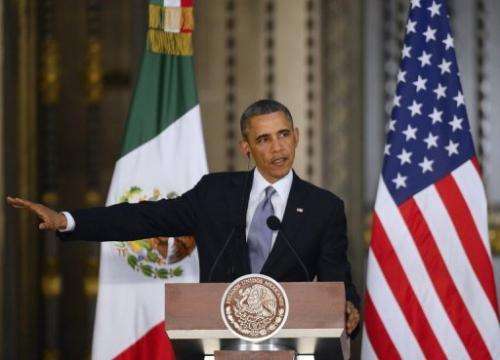US President Barack Obama speaks during a press conference in Mexico City, May 2, 2013. Obama Friday meets members of a privacy watchdog board, finally fully active after years of delays, to discuss a furor over US spy agency Internet and telephone snooping.
US President Barack Obama Friday meets members of a privacy watchdog board, finally fully active after years of delays, to discuss a furor over US spy agency Internet and telephone snooping.
The meeting will take place in the secure Situation Room of the White House to allow classified information to be discussed, and comes as Obama pledges to permit a public debate about the scope of the programs.
"The president looks forward to hearing from members of the board about their areas of focus and discussing recent developments, including the disclosure of classified information," said White House spokesman Jay Carney.
Carney also said that in the coming weeks, Obama would be meeting various unidentified "stakeholders" in the debate to foster public discussion about the National Security Agency (NSA) programs.
The five-member Privacy and Civil Liberties Oversight Board (PCLOB) was set in 2004 but has rarely been active. It has only recently been fully staffed, following years of partisan wrangling over its establishment.
It is an independent agency with a mission to analyze and review White House policies and actions on terrorism, and to ensure they are balanced with a need to protect civil liberties and privacy.
Obama has warned that to protect Americans from terrorism there must be some compromises regarding privacy but says he believes he has got the balance largely correct.
He said in Berlin on Wednesday that "lives have been saved" by the programs, details of which emerged in leaks to the Washington Post and Guardian newspapers, and around 50 terrorist plots had been disrupted.
Obama has repeatedly explained that the controversial activity, which involves sweeping up data on phone and Internet traffic, does not delve into the specific content of the calls or emails.
Only if there are leads related to terrorism or the proliferation of weapons of mass destruction would US agents ask a special court to allow them to look deeper into the records, he says.
© 2013 AFP























